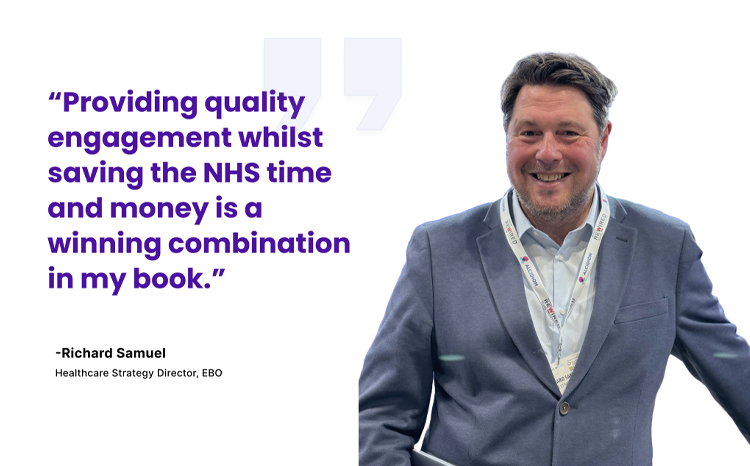A little more conversation: How conversational AI can help save our health service
- 8 April 2025

Richard Samuel held leading operations and strategy roles in the NHS, and was formerly NHS England Director and NHS Chief Executive. Now at EBO, he believes AI can make healthcare more efficient, personalised and human
You don’t have to be an NHS ‘lifer’ to always want the best for it, says Richard Samuel who is using his 25 years of leadership experience to help patients make the most of conversational AI.
His time in a national role, leading on outpatient care, clinical improvement and digital innovation, has left him in no doubt about the ever-increasing importance of digital and AI solutions.
But he knows that these alone are not the answer, which is why he is so fired up about his new role as director of healthcare strategy at EBO, a leading provider of AI-driven patient engagement solutions.
“The rush to remove people from processes used by patients creates interactions that feel totally inhuman,” says Samuel.
“We forget at our peril that conversations build understanding and inspire us to engage. That’s why systems which have their foundations in human behaviour will succeed.”
His decision to switch to the supplier side was inspired by huge advances in highly personalised AI.
“I’ve witnessed first-hand the care EBO takes to keep conversations personal – be it in a person’s language of choice or building on previous engagements. It’s phenomenal to watch a relay of meaningful dialogue and see the high degree of satisfaction for patients.
“Providing quality engagement whilst saving the NHS time and money is a winning combination in my book, especially when the public purse is under such strain. I love the blend of personalisation for patients and pragmatic solutions. Understanding what to augment and what to automate is a rare skill and creates efficiencies that add and not detract value.”
He adds: “EBO is grounded in behavioural science and schooled in nudge theory. Understanding people, their motivation and reservations, is at the heart of developing processes that really deliver for the individual and the NHS.
“I find it interesting when I hear organisations say that patients don’t want to engage with virtual agents. In the past, poorly designed chat solutions have been a source of frustration. However, people want their problem solved in the most expedient way possible and next generation virtual agents, such as EBO, represent a game-changer for patients.”
Samuel believes that the insight he brings from his national and regional roles will help EBO deliver higher levels of interoperability and efficiency for the NHS. Whilst keen to be known for its use of behavioural science and conversational AI, EBO also pays great attention to the ‘back end’. Its technology augments existing portal solutions and integrates into core digital infrastructure. Additionally, it automates repetitive administrative processes which can boost efficiency and increase productivity.
His operational experience from managing healthcare services has taught him about the pitfalls of moving from manual systems to poorly thought through alternatives.
“The worst of all worlds is when busy clinical or admin staff end up repeating or finishing off procedures where automation has fallen short. It’s time-consuming and damages trust in digital solutions,” he says.
“It’s easy to be persuaded by the promise of greater efficiency but if the whole pathway is not considered then it becomes a chain with a weak link. NHS staff have enough to do, without picking up the pieces of an oversold product.”
The range of patients for whom conversational AI could work is huge. It includes patients on pathways for pre-operative care and those who could, depending on their health, manage with less intervention.
EBO uses information from interacting with patients to manage their care accordingly. This can mean making sure that they have their next appointment in person or supporting them to take a further step, such as making a lifestyle change.
Intelligence gained from AI conversations can shape people’s investment in their health. Questions which are rooted in behavioural science deliver answers which assess the need for routine follow-ups or whether the patient would benefit more from knowing how to access care when they need it and not simply because an appointment has been booked.
With a successful track record and strong links in the NHS, Samuel says he thought long and hard about forging a new career.
“I want to continue being part of the improvement journey, not just in terms of efficiency and getting waiting lists down, but in driving up quality, he adds. “Conversational AI, when it’s done as well as EBO do it, will support the NHS in this challenge.”
Interested in understanding how conversational AI can improve the experience for your patients and your organisation’s efficiency? Get your starter guide to conversational AI for healthcare here.




